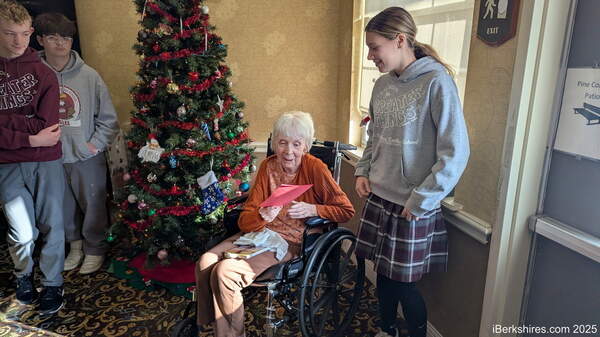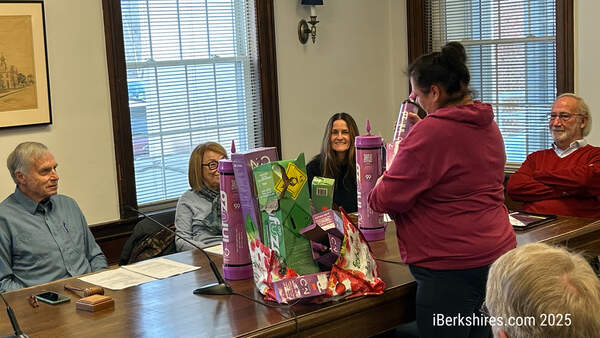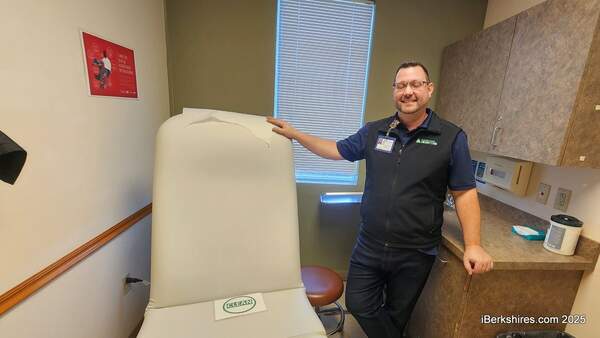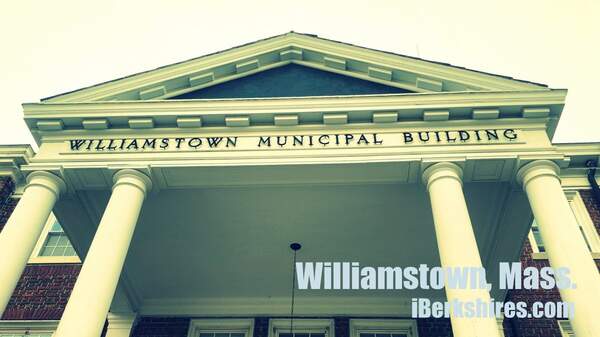Author Talks Writing With Williamstown Childhood Friends
 Author Michael Quadland returned to his childhood home to speak about his latest book. |
A group of Quadland's friends greeted him warmly when he arrived at the Milne Public Library on April 4 to speak about his newly released novel "Offspring."
"It was very special to go back to my hometown and be among friends I've known for 50 years," said Quadland, who had been on a book tour that took him to Chicago, New York City, and cities in Florida and Connecticut.
As his friends know, Quadland did not develop a passion for writing at a young age.
"I was not much of a reader or writer when I was young. I certainly did not think of being a writer," said Quadland. "I liked riding horses and thought I was going to be a veterinarian."
At the age of 12, he had a horse of his own; now he has a horse in Connecticut, where he is a resident, and rides everyday.
Quadland said he felt there was an "academic influence" in Williamstown. And after graduating from the former Williamstown High School, he went to Dartmouth College to receive a master of public health degree from Yale University and a doctorate in psychology from New York University.
He established a private psychotherapy practice, beginning what would be a more than 25-year career. In addition, he taught human sexuality at Mount Sinai School of Medicine in New York City.
In the 1980s, an AIDS epidemic hit New York, and fear was gripping the city and the nation.
"Because of my background in human sexuality, I became involved in research on how to get people to adopt safer sex practices as a means of reducing the possibility of infection with the virus," said Quadland. "A number of people in my practice had AIDS. It was a matter of helping them cope with a diagnosis which — at that time — was a death sentence."
When Quadland "got sort of burned out," he closed his practice in New York City, bought an 18th century farmhouse in Connecticut, and did some of the work in renovating it.
He found the work was good for him physically and emotionally. He thought about writing; he had published many articles in professional journals, and it occurred to him that he could write about the AIDS epidemic.
"But it was too fresh so I segued into writing my first book, 'That Was Then,'" he said.
Set in the '70s in New York and a small town in Massachusetts, "That Was Then" is a novel about child sexual abuse and how it affects people as they grow older. Quadland said that in his work, he had heard a lot about sexually abused children but he could not use it verbatim in the books he wrote.
"That would be unethical," he said. But people in Williamstown speculated about characters in the book being someone they knew. That is not the case, he explained, "Any one character is a conglomerate of several people, if anyone I know."
It took Quadland five years to complete "That Was Then," but he wrote his second novel "Offspring" in 2 1/2 years.
"I'm getting faster," he quipped.
"Offspring" is ultimately about a search for truth — not honesty in the moral sense, but the truth about ourselves, who we really are, what we believe in and where we fit in the world. It's a novel about our longing for a sense of family, "a sense of belonging," said the author, adding that he believes that people, like characters in his novel, are at their best when in sync with the truth about themselves — less defensive, more open and interesting.
Both of his books were published by Red Hen Press.
It is Quadland's habit to rise early, drink his coffee at the computer, answer some emails and then write.
"I like to leave something unfinished from the previous day. That way I don’t have to stare at a blank page," he said.
He writes as it comes to him, getting everything down before he does any editing.
"You can lose spontaneity when editing," he said.
His latest book, "Scattered Leaves" revolves around an elderly woman facing Alzheimer’s disease who falls when tending her roses in the garden. As she lies there, she reflects on her life.
"It's a story about family, secrets and how damaging secrets can be," said the author.
"Scattered Leaves" will be published soon, Quadland said, and art shows featuring his paintings — abstract work in acrylic — will be held at the White Gallery, Lakeville, Conn., May 5 through May 27 and at the Gunn Memorial Library and Museum, Washington, Conn., from April 20 through May 13.
K. Elaine Neely, a lifelong friend, recalled Quadland's interests and many talents as a youngster.
"He was about 12 when he played the organ and piano at St. Patrick's Church. He was the captain of the football team, and we skied at Dutch Hill (a popular ski area in southern Vermont from 1944 until 1985). We also rode horses on a lot of trails, and did horse shows and 4-H together," said Neely.
Thus, it should not come as a surprise that Quadland says, "It's nice to do new and different things. We don't have one career in life."















